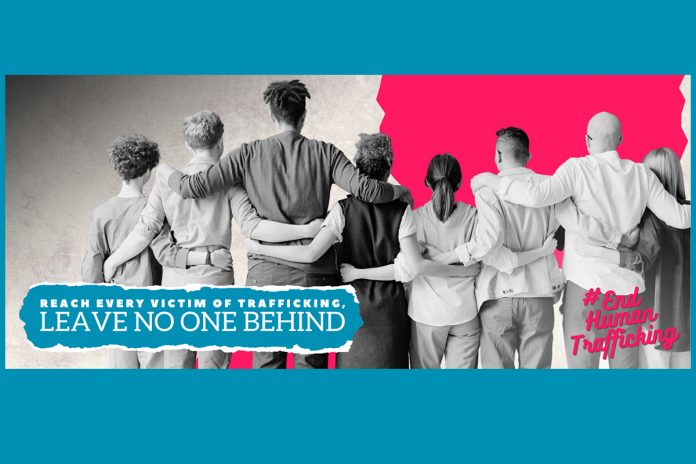Rome (Italy). July 30, 2023 is the World Day Against Trafficking in Human Beings, established by the United Nations General Assembly in 2013 to raise awareness among the international community of the situation of victims of trafficking and promote the defense of their rights.
Reach every victim of trafficking, leave no one behind is the theme for the Day 2023, which aims to raise awareness of the data and trends of the phenomenon of trafficking starting from the Global Report 2022 of the UNODC – the United Nations Office on Drugs and Crime – calling on governments, law enforcement agencies, public services, and civil society to strengthen prevention, support victims, and tackle trafficking. One of the goals of this edition of the Report is also to show the changes from historical trends since UNODC began collecting data in 2003.
Almost all Countries in the world are affected by trafficking, whether as a country of origin, transit or destination of the victims. Globally, nations seem to have let their guard down towards the phenomenon. In fact, case detections decreased by 11% in 2020 and sentences decreased by 27%, demonstrating a global slowdown in the criminal justice response to trafficking.
The Covid-19 pandemic has pushed the phenomenon increasingly underground, potentially increasing the dangers for victims, i.e., making it less likely that the crime will be brought to the attention of the authorities. In fact, 41% of victims who manage to escape their situation turn to the authorities on their own initiative, a sign that anti-trafficking responses are insufficient.
Furthermore, global crises, conflicts, and the climate emergency are increasing the risks associated with trafficking. Displacement and socio-economic inequalities are affecting millions of people around the world, making them vulnerable to exploitation by traffickers. Those who lack legal status, live in poverty, have limited access to education, healthcare or decent work, face discrimination, or come from marginalized communities are often the main targets of traffickers.
The theme of the Day 2023 invites you to deepen your knowledge of the phenomenon of trafficking and to become personally involved, as far as possible, in countering it with prevention, closeness, and help for the most vulnerable people. “Leaving no one behind” is also the challenge accepted by the 2030 Agenda for Sustainable Development and by the Sustainable Development Goals (SDGs), in particular by the SDG 5, 8 e 16.
This is also what Pope Francis recalled on 8 February 2023, addressing young people, in the Video Message for the 9th World Day of Prayer and Reflection against Trafficking in Persons on the theme Walking for Dignity:
“Walk for dignity, against human trafficking, leaving no one behind.
Walk with open eyes to recognize the processes that lead millions of people, especially young people, to be trafficked to be brutally exploited. Walk with an attentive heart to discover and support the daily journeys for freedom and dignity. Walk with hope in your feet to promote anti-trafficking actions. Walk together shaking hands to support each other and build a culture of encounter, which leads to the conversion of hearts and inclusive societies, capable of protecting the rights and dignity of every person.”
The World Day Against Trafficking in Human Beings challenges the Institute of the Daughters of Mary Help of Christians and the Educating Communities to continue their mission in favor of the integral development and promotion of every human person, intensifying their work in synodality with organizations and institutions to be together “a network of salvation” for many.
“The great questions of exclusion, the defense of life, human mobility, peace, care for creation, education become for us, for our Educating Communities, and for the Salesian Family, a call to rethink the mission in its structures, in the proposals, in the places to be privileged. In these processes, we are called to a new inculturation of the Gospel in the style of the Preventive System. (Acts of the GC 23 n.32)”.




















